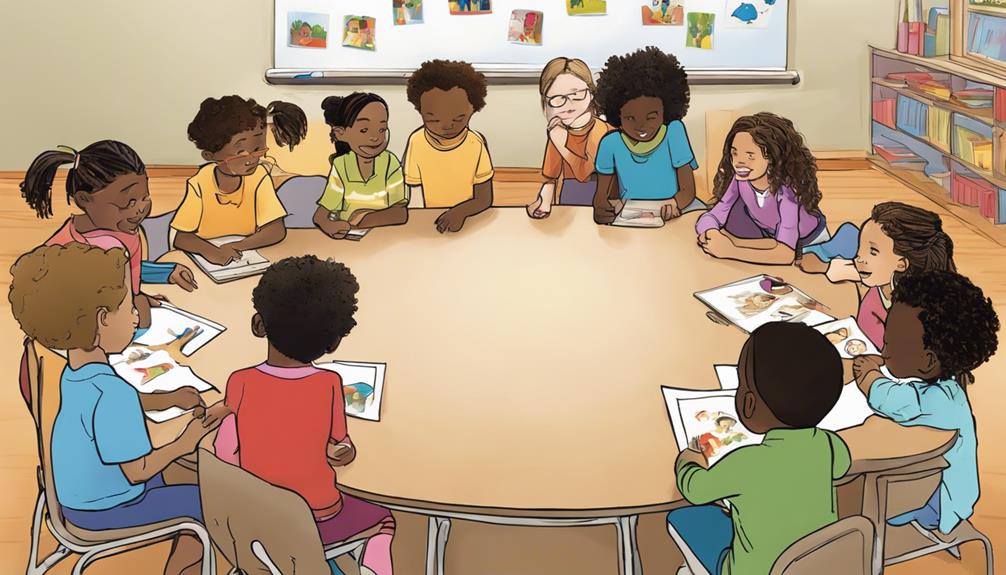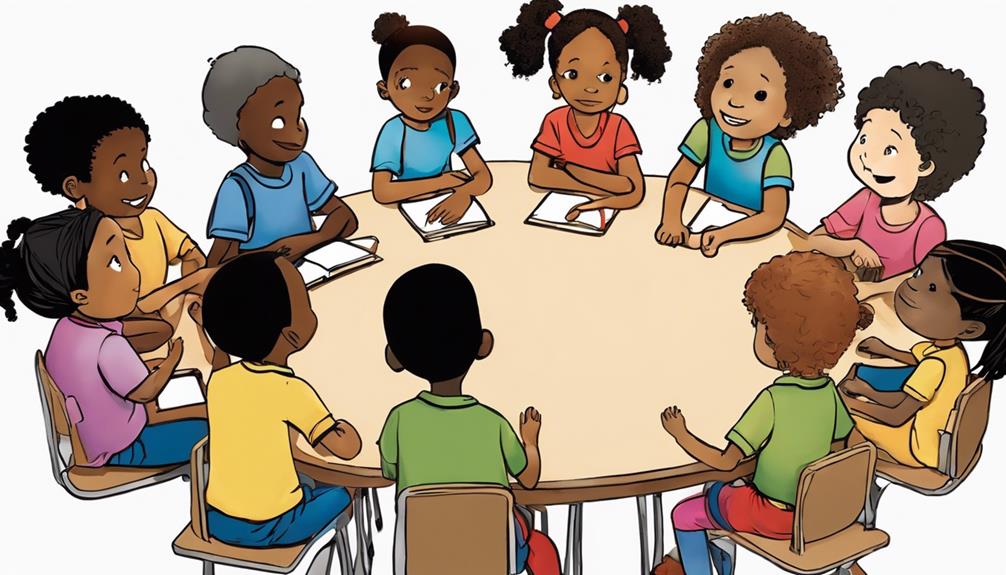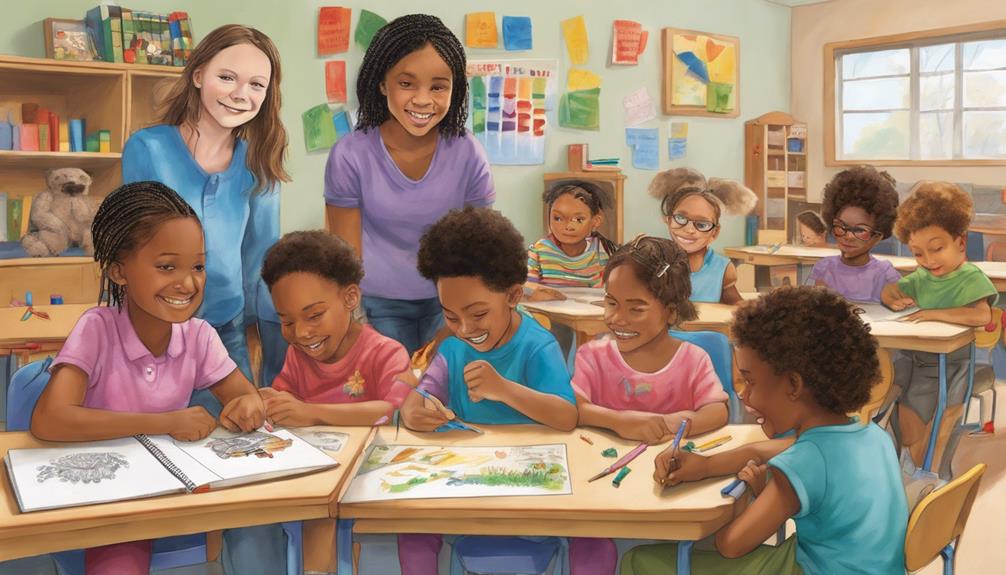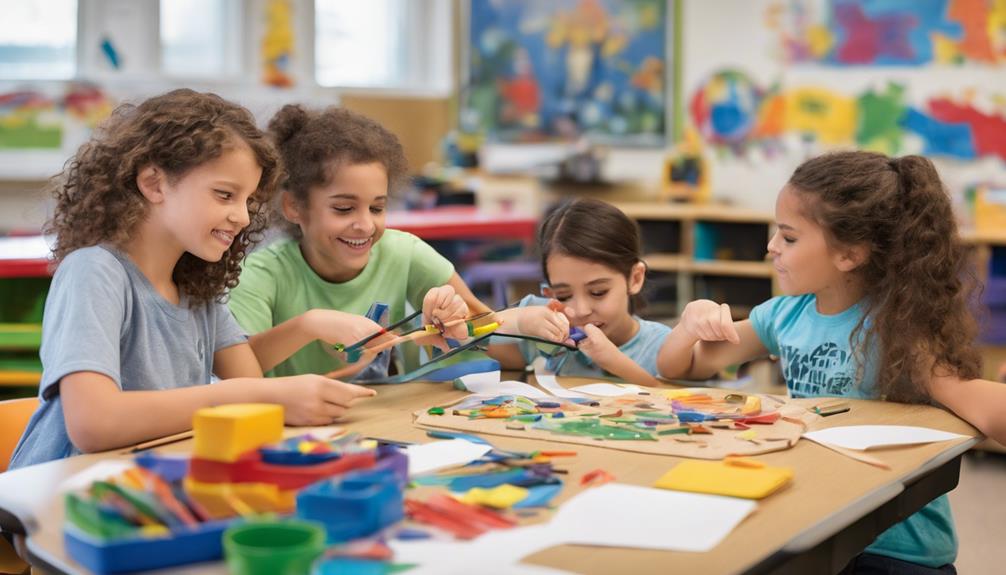While navigating the turbulent waters of discussing divorce in the classroom, it’s crucial to help children find their anchor amidst the disruption.
From seeking solace in the understanding eyes of a teacher to learning to navigate the choppy waves of their emotions, there are ways to guide children through this challenging time.
Let's explore five strategies that can provide children with the stability and support they need to weather the emotional whirlwind of divorce within the walls of their classroom.
Key Takeaways
- Seeking support from teachers and parents provides emotional aid.
- Utilize coping strategies like art and mindfulness techniques.
- Establish a safe and nurturing classroom environment for children.
- Encourage communication of feelings and maintain academic focus for stability.
Seeking Support From Teachers
During a divorce, children can greatly benefit from seeking support from their teachers. Divorce can be a challenging time for kids, and having a caring and understanding teacher can make a world of difference. Teachers can provide emotional support, creating a safe space for children to express their feelings and concerns about the divorce.
By collaborating with parents, educators can ensure that children's academic and emotional needs are met. Teachers can implement strategies to help children focus and succeed in school despite the challenges they may be facing at home. School counselors and support staff are also valuable resources that can provide additional guidance and support to children during this difficult time.
Utilizing Coping Strategies

Utilizing coping strategies is essential for children to navigate the challenges of divorce and maintain their emotional well-being in the classroom.
When a child is going through a divorce, it can be overwhelming and confusing. Parents play a crucial role in supporting their child during this time, but as teachers, we can also make a significant impact. We must create a safe space where children feel comfortable expressing their feelings.
Encouraging them to use art or writing as a form of expression can be incredibly therapeutic. Additionally, teaching mindfulness techniques like deep breathing can help children manage stress and anxiety.
Group activities that promote teamwork and social interaction can foster resilience and coping skills. By incorporating relaxation exercises such as guided imagery, we can assist children in managing emotional distress effectively.
Together, we can provide the support and tools necessary for children to thrive despite the challenges of divorce.
Establishing a Safe Space
Creating a safe and nurturing environment in the classroom is paramount for helping children feel secure and supported as they navigate the challenges of divorce. It's important to let children know that the classroom is a safe space where they can express their thoughts and feelings openly. Taking the time to listen carefully to what they've to say can make a significant difference in how they cope with the changes in their family dynamics.
Children need to feel that they can trust the adults around them and that their mental health is a priority. Establishing ground rules that promote respect and confidentiality can help create a supportive atmosphere where kids feel comfortable sharing their emotions. Whether through individual discussions, group activities, or access to a support group, providing child care and support can make a positive impact on how your kids cope with the challenges of divorce.
Communicating Feelings Openly

Encouraging children to openly express their feelings can significantly aid them in processing and coping with the emotions associated with divorce. Here are four ways in which promoting open communication can benefit children during this challenging time:
- Validating Children's Emotions: Letting children know that it's okay to feel a range of emotions about their parents' divorce can help them feel understood and accepted.
- Creating a Safe Space: Providing a non-judgmental environment where children feel comfortable expressing their feelings can promote emotional well-being.
- Teaching Healthy Communication: Guiding children on how to effectively communicate their emotions can enhance their ability to navigate the complexities of divorce.
- Listening Actively: Taking the time to actively listen to children when they talk about their feelings can build trust and resilience in them.
Maintaining Focus on Academics
When children are navigating the challenges of divorce, maintaining focus on academics becomes crucial in fostering a sense of stability and routine in their lives. Establishing a consistent homework routine can assist children in staying engaged with their schoolwork amidst the emotional challenges they may be facing.
It's essential to inform teachers about the divorce so they can provide additional support and understanding for the child's academic struggles. Creating a stable environment at home with predictable routines can help children concentrate better on their studies. By maintaining regular activities and schedules, children can find a sense of normalcy that aids in their academic focus.
Additionally, providing a supportive and encouraging atmosphere can help children cope with the changes divorce brings and stay motivated in their academic pursuits. Remember, a supportive community both at home and at school can play a crucial role in helping children navigate their academic journey during this challenging time.
Frequently Asked Questions
How Children Can Cope With Divorce?
We can help children cope with divorce by encouraging them to express emotions through art, writing, or talking to a trusted adult. Engaging in physical activities like sports or yoga can provide stress relief and relaxation.
How Preschoolers and School Aged Children Cope With Divorce?
We understand how preschoolers and school-aged children cope with divorce. They may exhibit regressive behaviors, express emotions through behavior changes, or struggle with anxiety. Consistent routines and open communication are vital for helping them navigate divorce challenges.
How Can Teachers Help Children Going Through Divorce?
We believe teachers can offer understanding, empathy, and a safe space for children navigating divorce. Encouraging open communication, working with counselors, maintaining routines, and being vigilant for signs of distress can help students cope and thrive.
What Are Some Strategies for Coping With Divorce?
Coping with divorce can be challenging. We recommend expressing feelings openly, maintaining routines, offering reassurance, clarifying it's not their fault, and seeking professional help if needed. Remember, you're not alone, and support is available.
What Are Some Additional Ways Children Can Cope With Divorce in a Classroom Setting?
In a classroom setting, helping kids through divorce process can involve creating a safe space for open discussion and emotional support. Providing resources like books or counseling can offer guidance, while fostering a supportive peer community can help children feel less isolated and more understood during this challenging time.
Conclusion
As we navigate the challenges of divorce in class, remember that we're like trees weathering a storm together.
With the support of our teachers, the use of coping strategies, and open communication, we can stand tall and strong.
Let's create a safe space where our feelings are heard and acknowledged, allowing us to focus on our academics with courage and resilience.
Together, we can grow through this storm and emerge even stronger.










